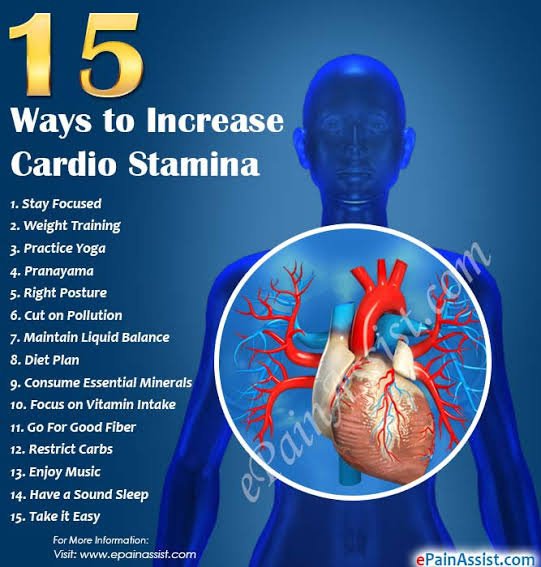Why is My Stamina So Low?
Feeling tired and having low stamina could be due to various reasons such as poor diet, lack of sleep, dehydration, and an inactive lifestyle. Low stamina can be a frustrating condition that can significantly limit your productivity and quality of life.
It is a common symptom of underlying health issues, ranging from nutritional deficiencies to chronic illnesses like diabetes, heart disease, or hypothyroidism. While everyone can experience occasional fatigue, persistent low stamina requires a closer look at your lifestyle choices and potential underlying medical conditions.
We’ll explore some common reasons for low stamina and offer practical tips to boost your energy levels and overall health.
Stamina And Its Importance
Stamina is the energy needed for physical or mental activity. Inadequate sleep, poor diet, lack of exercise, and certain medical conditions can all contribute to low stamina, making it difficult to perform everyday tasks. Building your stamina requires a combination of a well-balanced healthy lifestyle and gradual physical exercise.
Role Of Stamina In Daily Life
Stamina is the ability to sustain physical and mental exertion for an extended period without feeling exhausted. It plays a significant role in our daily life as it directly affects our physical and mental health. Having low stamina can impact our ability to perform everyday activities, affecting our productivity, and making us feel lethargic and tired all the time. Furthermore, it can lead to a lack of motivation to exercise or engage in physical activities, hindering our physical fitness goals. Therefore, it is crucial to maintain and improve your stamina to lead a healthy and active lifestyle.Factors Contributing To Low Stamina
Several factors can contribute to low stamina, including poor dietary habits, lack of exercise, insufficient sleep, chronic stress, and medical conditions such as anemia, hypothyroidism, and depression. Poor dietary habits, such as consuming a diet low in nutrients and high in processed foods, can impact our energy levels and reduce our stamina. Similarly, lack of physical activity and insufficient sleep can lead to reduced endurance and fatigue, making it challenging to perform daily activities efficiently. Additionally, chronic stress can also impact our mental and physical health, affecting our energy levels and reducing our stamina. Understanding these factors can help us make necessary changes and improve our stamina.Ways To Improve Stamina
Fortunately, there are several ways to improve your stamina, such as adopting a healthy diet, engaging in regular physical activity, practicing stress-reducing techniques, and ensuring adequate sleep. Consuming a diet rich in nutrients, such as carbohydrates, proteins, and healthy fats, can provide the energy required to sustain physical and mental exertion. Similarly, engaging in regular physical activity, such as cardio, strength training, or yoga, can help improve endurance and stamina. Additionally, practicing stress-reducing techniques, such as meditation, deep breathing, or yoga, can help reduce stress and anxiety, thus improving our mental and physical health. Lastly, ensuring adequate sleep can help our body recharge and replenish, improving our energy levels and endurance.In Conclusion
Stamina plays a crucial role in our daily life and directly impacts our physical and mental health. Several factors can contribute to low stamina, reducing our productivity and energy levels. However, adopting a healthy lifestyle, including proper nutrition, regular physical activity, sound sleep, and stress-reducing techniques, can help improve our stamina and overall health.
Credit: www.reddit.com
Lifestyle Factors To Consider
Improper diet, lack of exercise, and poor sleeping habits are common lifestyle factors that can contribute to low stamina levels. It’s important to evaluate your daily routine and make any necessary changes to optimize your energy and endurance.
If you find yourself struggling to keep up with everyday activities, then you may have low stamina. This feeling of exhaustion can be incredibly frustrating and often leaves people wondering why they can’t seem to function on a normal level. While there are many reasons why someone’s stamina may be low, there are several lifestyle factors that should be considered before seeking medical intervention. Here are some of the lifestyle factors that may be contributing to your low stamina:Diet And Nutrition
What you eat and drink plays a significant role in how much energy you have throughout the day. If you’re consuming a diet that is high in processed foods and low in nutrients, then it’s likely that your stamina will suffer. Making simple changes to your diet, such as adding more fruits and vegetables, can make a big difference. Additionally, staying hydrated throughout the day is essential for maintaining good stamina.Sleep Habits And Quality
The quality and quantity of your sleep can significantly impact your energy levels. If you’re not getting enough sleep or not sleeping well, then it’s likely that you’ll feel tired and sluggish throughout the day. Developing healthy sleep habits, such as going to bed at the same time every night, avoiding electronics before bedtime, and creating a calm sleeping environment, can help improve the quality of your sleep, which in turn will improve your stamina.Activity Level
It may seem counterintuitive, but engaging in regular physical activity can actually help improve your stamina. Engaging in moderate activity, such as walking or jogging, for at least 30 minutes a day can help increase your overall endurance. Additionally, incorporating strength training exercises can help build muscle and improve your stamina over time. By making simple lifestyle changes, such as improving your diet, sleep habits, and activity level, you can significantly improve your stamina and overall quality of life. If you’ve made these changes and still find your stamina to be low, then it may be time to seek medical advice. However, taking a holistic approach to lifestyle factors is the first step in improving your stamina and overall health.Medical Conditions That Impact Stamina
Various medical conditions such as asthma, anemia, hypothyroidism, and sleep apnea can result in low stamina. These conditions could lead to difficulty breathing, reduced energy levels and diminished oxygen supply. Getting an accurate diagnosis and seeking the right treatment may help improve overall stamina.
As we age, it’s common to feel like our stamina has taken a hit. You may find that you tire more easily or that you don’t have the same level of energy that you used to. In some cases, this decrease in stamina may be due to medical conditions. In this article, we’ll explore three medical conditions that can impact your stamina: anemia, chronic fatigue syndrome, and thyroid disorders.Anemia
Anemia is a condition in which your body doesn’t have enough red blood cells to carry oxygen to your tissues. This can leave you feeling fatigued, weak, and short of breath. Anemia can be caused by a variety of factors, including iron deficiency, vitamin deficiency, blood loss, and chronic disease. If you suspect that you may have anemia, it’s important to speak with your doctor. Your doctor may recommend blood tests or other diagnostic procedures to determine the cause of your anemia. Treatment options for anemia may include iron supplements, vitamin supplements, changes in diet, or medications.Chronic Fatigue Syndrome
Chronic fatigue syndrome (CFS) is a complex condition that is characterized by persistent fatigue that is not alleviated by rest. In addition to fatigue, people with CFS may experience pain, difficulty sleeping, cognitive impairment, and other symptoms. The cause of CFS is not fully understood, but it may be related to viral infections, immune system dysfunction, or hormonal imbalances. There is no cure for CFS, but there are a variety of treatment options available. Treatment may include medications, cognitive behavioral therapy, and lifestyle changes such as exercise and stress management.Thyroid Disorders
The thyroid gland is a small butterfly-shaped gland in the neck that produces hormones that regulate metabolism. If your thyroid gland is not functioning properly, it can result in a variety of symptoms, including fatigue, weight gain or loss, difficulty regulating body temperature, and more. Thyroid disorders can be caused by a variety of factors, including autoimmune disease, radiation, and medication. Treatment for thyroid disorders generally involves medication to regulate hormone levels. Overall, if you’re experiencing persistent fatigue or a decrease in stamina, it’s important to speak with your doctor. By getting an accurate diagnosis and appropriate treatment, you can improve your quality of life and regain your energy and vitality.Tips To Improve Stamina
Improve your stamina by following a healthy lifestyle that includes regular exercise, a balanced diet, and sufficient sleep. Other tips to increase your endurance include engaging in interval training, staying hydrated, and gradually increasing the intensity of your workouts. If you are experiencing low stamina levels, consult with a healthcare professional to determine the underlying cause.
If you’ve noticed yourself feeling more fatigued than usual, it could be due to low stamina. Fortunately, there are ways to improve your stamina and increase your energy levels. Here are some tips to help you get started.Exercise And Physical Activity
Regular exercise can help boost your stamina and improve your overall cardiovascular health. It’s important to start with exercises that match your fitness level and gradually increase your efforts. Aerobic exercises like running, cycling, swimming, and dancing are great options. It’s important to track your progress and build on your results over time. In addition to aerobic exercises, strength training can also help to build endurance and stamina.Stress Management
Stress can drain your energy levels and hurt your stamina. One way to manage stress is to prioritize self-care by getting enough sleep, practicing relaxation techniques like yoga and meditation, and taking time for hobbies and activities that you enjoy. It’s also important to identify the sources of stress and find ways to minimize or eliminate them as much as possible.Hydration
Staying hydrated is essential to maintaining your stamina. Dehydration can cause fatigue and reduce physical performance. Make sure to drink plenty of water throughout the day, especially before and during physical activity. It’s also important to eat foods that are high in water content, such as fruits and vegetables. In conclusion, improving your stamina requires regular exercise, effective stress management, and proper hydration. By incorporating these tips into your lifestyle, you can increase your energy levels and achieve your fitness goals.When To Seek Medical Attention
It’s common to experience a decrease in stamina from time to time, but if you find that you’re struggling to complete everyday tasks, such as climbing stairs or taking a brisk walk, you might want to consider seeking medical attention.
Signs And Symptoms To Watch For:
- Feeling tired or fatigued, even after getting sufficient rest
- Difficulty completing everyday tasks that require physical exertion
- Shortness of breath or difficulty breathing during physical activity
- Unexplained weight loss or gain
- Lack of motivation or interest in activities you used to enjoy
If you notice any of these symptoms, it’s important to speak with a healthcare provider to determine what’s causing your low stamina and develop a plan to address it.
Seeing A Healthcare Provider:
When you meet with your healthcare provider, they will likely perform a physical exam, review your medical history, and may run blood tests to help identify any underlying health conditions that could be causing your low stamina.
Depending on their findings, your healthcare provider may recommend lifestyle changes, such as regular exercise and a balanced diet, or prescribe medication to address specific health conditions. By working with your healthcare provider, you can take steps to improve your stamina and quality of life.

Credit: www.reddit.com

Credit: www.reddit.com
Frequently Asked Questions For Why Is My Stamina So Low?
How Do You Fix Low Stamina?
To fix low stamina, you should focus on improving your physical fitness by exercising regularly, eating a balanced diet, staying hydrated, and getting enough sleep. Additionally, reducing stress levels and avoiding alcohol and smoking can also help improve stamina. Remember to consult a healthcare professional before starting any new exercise or dietary regimen.
What Causes Short Stamina?
Short stamina can be caused by various factors such as being overweight, lack of physical activity, poor nutrition, stress, anxiety, inadequate sleep, and certain medical conditions like anemia and asthma. It can also be a result of smoking or excessive alcohol consumption.
How Can I Increase My Stamina Level?
To increase your stamina level, you can incorporate regular cardiovascular exercise into your routine, such as running or swimming. Gradually increase the intensity and duration of your workouts. Eating a balanced diet that includes proteins, healthy fats, and complex carbohydrates can also help boost your endurance.
Additionally, incorporating strength training can help improve your overall fitness level.
Conclusion
To sum up, low stamina can have many underlying causes, ranging from an unhealthy lifestyle to underlying health conditions. A sedentary lifestyle, poor diet, lack of sleep, and stress are some of the common factors that can lead to low stamina.
By making lifestyle changes, including regular exercise, a balanced diet, sufficient sleep, and stress management techniques, you can improve your stamina and energy levels. It’s important to consult a doctor if you have persistent low stamina to rule out any underlying medical conditions.
With some effort and commitment, you can improve your overall well-being and lead a more active and fulfilling life.







